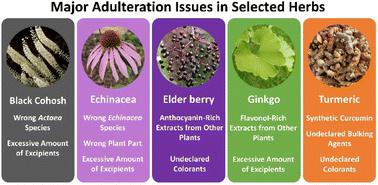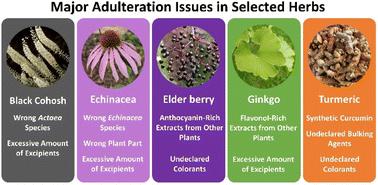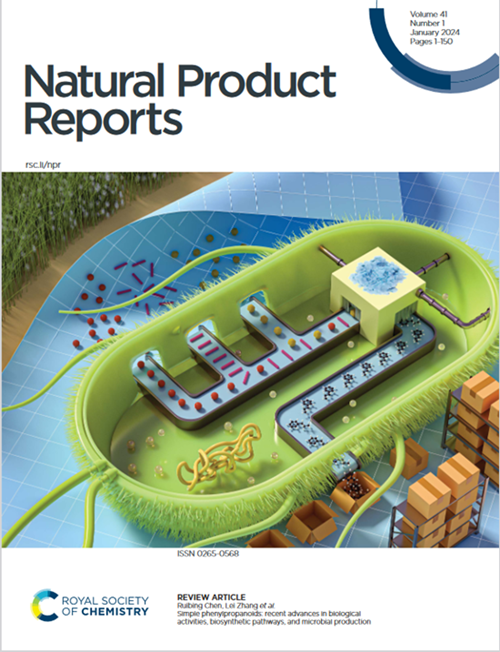估算常用草药黑升麻、紫锥菊、接骨木莓、银杏和姜黄的掺假程度--其挑战和局限性。
IF 10.2
1区 化学
Q1 BIOCHEMISTRY & MOLECULAR BIOLOGY
引用次数: 0
摘要
覆盖范围:截至 2023 年 7 月植物天然药用产品和膳食补充剂因其对健康和保健的积极影响而在全球范围内得到广泛应用。然而,无意或有意的掺假行为可能会损害植物药产品的有效性和安全性。全球市场上存在掺假植物成分的情况在已发表的文献中已有记载,但一个关键问题,即掺假的程度如何,仍有待回答。本综述旨在估算黑升麻根茎、紫锥菊根或草本、接骨木果实、银杏叶和姜黄根/根茎制剂的掺假率。根据本文检索到的 78 篇出版物中提供的信息,2995 个样品中有 818 个被报告掺假和/或贴错标签。银杏叶样本(n = 533)的掺假率最高,为 56.7%;其次是黑升麻根茎样本(n = 322),为 42.2%;紫锥菊根茎样本(n = 200),为 28.5%;接骨木果实样本(n = 695),为 17.1%;姜黄根茎样本(n = 1247),为 16.5%。与作为食物/食品补充剂出售的产品相比,作为持证或注册草药出售的产品掺假风险较低。数据显示,不同成分的掺假率差别很大。由于估计掺假程度所依据的现有数据存在很大局限性,而且植物膳食补充剂市场变化迅速,因此本出版物中研究的五种草药得出的结论不能适用于全球市场上交易的其他植物药。不过,数据清楚地表明,相当一部分植物膳食补充剂并不含有标签上声称的成分。本文章由计算机程序翻译,如有差异,请以英文原文为准。


Estimating the extent of adulteration of the popular herbs black cohosh, echinacea, elder berry, ginkgo, and turmeric – its challenges and limitations
Covering: up to July 2023
Botanical natural medicinal products and dietary supplements are utilized globally for their positive impacts on health and wellness. However, the effectiveness and safety of botanical products can be compromised by unintentional or intentional adulteration. The presence of adulterated botanical ingredients in the global market has been documented in the published literature but a key question, namely what the extent of adulteration is, remains to be answered. This review aims to estimate the prevalence of adulteration in preparations made from black cohosh rhizome, echinacea root or herb, elder berry, ginkgo leaf, and turmeric root/rhizome. According to the information provided in the 78 publications retrieved for this paper, 818 of 2995 samples were reported to be adulterated and/or mislabeled. Ginkgo leaf samples (n = 533) had the highest adulteration rate with 56.7%, followed by black cohosh rhizome (n = 322) samples with 42.2%, echinacea root/herb (n = 200) with 28.5%, elder berry (n = 695) with 17.1%, and turmeric root/rhizome (n = 1247) with 16.5%. Products sold as licensed or registered herbal medicines were found to have a lower risk of adulteration compared to products sold as dietary/food supplements. The data show that the adulteration rate substantially differs from one ingredient to the other. Due to the significant limitations of the available data upon which the estimated extent of adulteration is based, and the rapidly changing botanical dietary supplement market, conclusions from the five herbs examined in this publication cannot be applied to other botanicals traded in the global market. However, the data clearly show that a substantial portion of the botanical dietary supplements do not contain what is claimed on their labels.
求助全文
通过发布文献求助,成功后即可免费获取论文全文。
去求助
来源期刊

Natural Product Reports
化学-生化与分子生物学
CiteScore
21.20
自引率
3.40%
发文量
127
审稿时长
1.7 months
期刊介绍:
Natural Product Reports (NPR) serves as a pivotal critical review journal propelling advancements in all facets of natural products research, encompassing isolation, structural and stereochemical determination, biosynthesis, biological activity, and synthesis.
With a broad scope, NPR extends its influence into the wider bioinorganic, bioorganic, and chemical biology communities. Covering areas such as enzymology, nucleic acids, genetics, chemical ecology, carbohydrates, primary and secondary metabolism, and analytical techniques, the journal provides insightful articles focusing on key developments shaping the field, rather than offering exhaustive overviews of all results.
NPR encourages authors to infuse their perspectives on developments, trends, and future directions, fostering a dynamic exchange of ideas within the natural products research community.
 求助内容:
求助内容: 应助结果提醒方式:
应助结果提醒方式:


